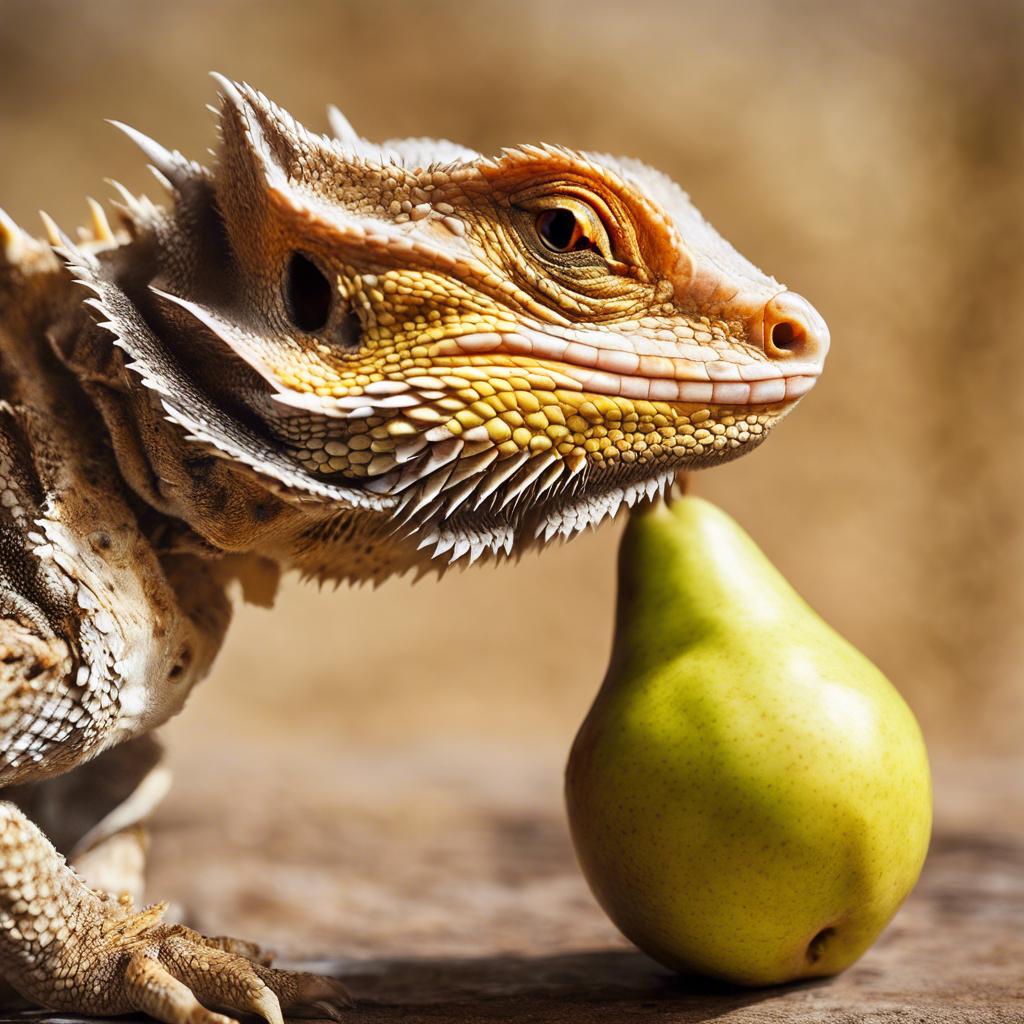Bearded dragons are popular pets known for their unique appearance and docile nature. As omnivores, they have a diverse diet that includes both insects and plant matter. While their primary diet consists of insects, they can also consume a variety of fruits and vegetables. Pears are a common fruit that many people enjoy, but can bearded dragons eat them?
Key Takeaways
- Bearded dragons can eat pears, but they should be given in moderation.
- Pears are a good source of fiber and vitamin C for bearded dragons.
- Bearded dragons should only be given a small amount of pear as a treat, not as a staple food.
- Pears should be washed and cut into small pieces before feeding to bearded dragons.
- Other fruits that are safe for bearded dragons include apples, blueberries, and strawberries.
Nutritional Value of Pears for Bearded Dragons
Pears are a nutritious fruit that can provide several health benefits to bearded dragons. They are a good source of fiber, which aids in digestion and helps prevent constipation. Pears also contain vitamin C, which is important for the immune system and overall health. Additionally, they provide potassium, which helps regulate blood pressure and maintain proper heart function.
Pears also contain some calcium and vitamin A, which are essential for bearded dragon health. Calcium is necessary for strong bones and teeth, while vitamin A supports eye health and promotes healthy skin. However, it's important to note that pears should not be the sole source of these nutrients in a bearded dragon's diet.
Quantity of Pears to Feed Bearded Dragons
While pears can be beneficial for bearded dragons, they should be fed in moderation. Too much fruit can cause digestive problems, such as diarrhea or bloating. It's best to offer a small slice or two of pear per week as a treat or occasional addition to their diet.
It's important to remember that fruits should not make up the majority of a bearded dragon's diet. Their primary food source should be insects, such as crickets or mealworms, which provide essential protein. Fruits and vegetables should only make up about 10-20% of their overall diet.
Preparing Pears for Bearded Dragons
Before feeding pears to your bearded dragon, it's important to properly prepare them. Pears should be washed thoroughly to remove any pesticides or dirt that may be present on the skin. It's also recommended to peel the pear before feeding, as the skin can be difficult for bearded dragons to digest.
Once the pear is washed and peeled, it can be sliced into small pieces or mashed for easier digestion. Bearded dragons have small mouths, so it's important to cut the pear into small, manageable pieces. This will help prevent choking and ensure that they can easily consume the fruit.
Other Fruits Suitable for Bearded Dragons
While pears can be a tasty treat for bearded dragons, it's important to vary their diet and not rely solely on one type of fruit. There are several other fruits that are safe and nutritious for bearded dragons to consume.
Apples are a popular choice and can be fed in small slices or cubes. Berries, such as strawberries or blueberries, are also safe for bearded dragons and provide additional antioxidants. Melons, such as watermelon or cantaloupe, can be offered in small pieces as well.
It's important to note that not all fruits are safe for bearded dragons. Some fruits, such as citrus fruits like oranges or lemons, can be too acidic and cause digestive upset. It's best to stick to fruits that are low in acid and high in fiber.
Bearded Dragon Care: Proper Feeding Schedule

Feeding a bearded dragon a balanced diet is crucial for their overall health and well-being. They should be fed once a day, with a variety of fruits, vegetables, and insects. It's important to monitor their weight and adjust their diet accordingly.
When feeding fruits and vegetables, it's best to offer them in the morning when the bearded dragon is most active. This allows them time to digest their food throughout the day. Insects can be offered in the afternoon or evening, as they are a good source of protein and can help stimulate their natural hunting instincts.
Bearded Dragon Care: Hydration and Water Intake
In addition to their diet, bearded dragons also need access to fresh water at all times. While they can get hydration from fruits and vegetables, water should always be available in their enclosure. This can be provided through a shallow dish or a water bottle designed for reptiles.
It's important to note that bearded dragons may not always drink water from a dish, as they prefer to get their moisture from their food. However, it's still important to offer water as an option, especially during hot weather or if they are not consuming enough hydrating foods.
Bearded Dragon Care: Enclosure and Lighting
Proper housing is essential for the health and well-being of bearded dragons. They require a spacious enclosure that allows them room to move and explore. The enclosure should also have proper lighting and heating to mimic their natural environment.
UVB lighting is particularly important for bearded dragons, as it helps them produce vitamin D3, which is necessary for calcium absorption. Without adequate UVB lighting, bearded dragons can develop metabolic bone disease, which can lead to weak bones and other health issues.
The enclosure should also have a temperature gradient, with a basking spot that reaches around 95-100 degrees Fahrenheit (35-38 degrees Celsius) and a cooler area around 75-85 degrees Fahrenheit (24-29 degrees Celsius). This allows the bearded dragon to regulate their body temperature and thermoregulate.
Health Issues: Overfeeding and Obesity in Bearded Dragons
Overfeeding is a common issue in pet reptiles, including bearded dragons. Feeding them too much or offering too many high-calorie foods can lead to obesity and other health problems. It's important to monitor their diet and adjust accordingly to prevent overfeeding.
Bearded dragons should be weighed regularly to ensure they are maintaining a healthy weight. If they are gaining weight too quickly or becoming overweight, it may be necessary to reduce the amount of food offered or adjust the types of food being fed.
Health Issues: Digestive Problems and Pears for Bearded Dragons
While pears can be a nutritious addition to a bearded dragon's diet, they can also cause digestive problems if fed in excess or if the bearded dragon has a sensitive stomach. Some bearded dragons may have difficulty digesting certain fruits, including pears.
If a bearded dragon experiences diarrhea, bloating, or other digestive issues after consuming pears, it's important to monitor their digestion and adjust their diet accordingly. It may be necessary to reduce or eliminate pears from their diet and focus on other fruits and vegetables that are better tolerated.
In conclusion, bearded dragons can enjoy pears as part of a varied diet. However, it's important to feed them in moderation and monitor their digestion for any signs of discomfort. Providing proper care, nutrition, and a balanced diet will ensure a happy and healthy bearded dragon.
If you're curious about whether bearded dragons can have pears as part of their diet, you'll definitely want to check out this informative article from Reptile Wizard. They provide expert insights and advice on reptile care, including a detailed discussion on the suitability of pears for bearded dragons. To learn more, click here: https://reptilewizard.com/contact-us/.
FAQs
Can bearded dragons eat pears?
Yes, bearded dragons can eat pears as they are safe for them to consume.
Are pears a good source of nutrition for bearded dragons?
Pears are a good source of fiber and vitamin C for bearded dragons, but they should not be the main source of nutrition.
How should pears be prepared for bearded dragons?
Pears should be washed thoroughly and cut into small pieces before feeding them to bearded dragons.
Can bearded dragons eat pear skin?
Bearded dragons can eat pear skin, but it should be cut into small pieces to avoid choking hazards.
How often should bearded dragons be fed pears?
Pears should be given to bearded dragons as an occasional treat and not as a regular part of their diet.
What are the potential risks of feeding pears to bearded dragons?
Overfeeding pears to bearded dragons can lead to digestive issues such as diarrhea. Additionally, the high sugar content in pears can cause health problems if consumed in excess.

